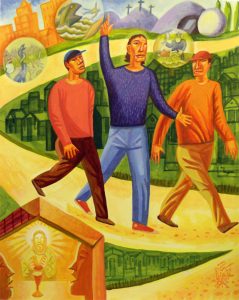Nerys writes: During the last couple of weeks, I have been delighted to have some dry afternoons to work in the garden of our home in Argyle Way. The soil on the hillside the our side of Dunblane is quite heavy clay. Every winter, the weight of the snow and the driving rain causes it to become quite compacted. So my first job every spring it to turn over the borders and planting areas to open up the soil. It is heavy, tiring work but any gardener would tell you that it’s essential if any new shoots are to push their way through the earth later in the season. Also, I know from experience that a hard, packed surface won’t be able to receive moisture from the spring showers. The water will run off without soaking the roots of the plants.

Jesus understood this. He knew that the packed soil around the edges of fields where people and animals walked, would not yield a harvest however many seeds the sower scattered there. His parable reminds us that the seeds of God’s goodness will not grow in a person who is not ready to accept it. Open hearts and open minds are essential to receive the life that God constantly offers us.

This kind of opening up is at the heart of the Easter story which begins with a wide open tomb. Angels appear, inviting women beaten down by helplessness, grief and anxiety not to be afraid but to open their inner selves to new possibilities. As they listen, they hear a profound and startling message: ‘He is not here for he is risen’. Their minds struggle to accept this incredible news. Mark’s Gospel tells us that they fled from the tomb for terror and amazement had seized them. Overcome by fear, the soil of their hearts was not receptive. According to Mark, they went straight home without saying a word to anyone for they were afraid.
We also are fearful people. The author Henri Nouwen identified over forty years ago the power that fear has to control us. ‘It often seems that fear has invaded every part of our being to such a degree that we no longer know what a life without fear would feel like’, he wrote, Fear closes our hearts to new possibilities, it prevents hope and joy.
Mark’s women aren’t alone in responding to the open tomb in this way. In John’s Gospel, Peter and his companion go inside and notice the graveclothes neatly arranged. The unnamed disciple sees and believes. He has a moment of recognition and his heart is opened to the possibility that God is at work. I find it interesting that we’re not told what Peter thought or felt. I wonder if he was so burdened by remorse that he was unable to respond to what he saw?
Many of us, like Peter, don’t find it easy to open up to God’s forgiveness and unconditional love. We allow our guilt and shame to build up into a thick crust around our hearts preventing the gentle work of reconciliation from happening.
Like the women in Mark, both disciples go home and keep the news to themselves. They leave Mary Magdalene at the tomb sobbing. She sees the angels but is so wrapped up in her grief, so intent on her search for a dead body, that she doesn’t realise who they are. She doesn’t even wait for them to respond to her question. She turns away. All the signs are there that God is at work but she doesn’t see or understand them. She doesn’t even recognise Jesus when he stands right in front of her. Blinded by her tears, she turns away.
Many of us are familiar with the desolation felt by Mary, affected as we have been by the global events of the last few years and also perhaps by personal losses. Our natural reaction is to curl up inside, nursing our grief, rather than opening ourselves up to the healing love of God. The familiar voice of Jesus cuts through Mary’s preoccupation with her pain, calling her back into relationship with him. She sees, she understands, she responds – eyes, mind and heart open to the one she calls her teacher.
Mary runs to tell the others ‘I have seen the Lord!’ but they don’t believe her. The author of Mark’s Gospel has Jesus later reproaching the disciples for their lack of faith and stubbornness. It’s easy to dismiss these uncharacteristically harsh words but sometimes we can be our own worst enemies. Sometimes we choose to keep our hearts and minds closed to wonder and surprise. We resist change, we refuse new attitudes, new opportunities, even though we know deep in our hearts that this is what would bring new life and growth in us.
We’re not told in John’s Gospel why Thomas had refused to accept the words of his excited friends, although he must have seen the transformation in them as they had earlier seen the transformation in Mary. It seems that he also just couldn’t open his heart and mind to the wonderful possibility that it’s the crucified Jesus they had seen. He needed proof. He needed to see for himself.
There is probably something of Thomas in each one of us. There are times when we think we need something specific from God and nothing else will do. It’s ironic that Jesus challenges Thomas’ resistance by inviting him to touch the openness of his wounds. ‘Thomas’, Jesus says, ‘don’t close yourself off but believe, be open, receive the truth’. Thomas surrenders and with great vulnerability and great faith responds, ‘My Lord and my God!’
In our Gospel passage today, Luke 24.13-35, the author recounts that the eyes of the two disciples, like those of Mary, were closed to their risen Lord when he joined them on their journey. Their conversation suggests that they were too caught up in their dashed hopes and broken dreams to realise that the embodiment of all their expectations was walking beside them.

The same thing can happen to us. Our preconceived notions of how things should be can close our minds and hearts to other possibilities. Jesus responds by coming alongside the two travellers, encouraging them to let go of their fixed ideas, turning over their inner beings and seeding them with hope and trust until they are ready to commune with him at the table. It is only later that they realise how his loving presence had opened them up as he opened the Scripture to them and broke open the bread.
On that same evening in John’s Gospel, Jesus once more meets his followers gathered behind closed doors, and opens them up to himself and to his peace and his joy. The image used by John for the giving of the Holy Spirit is of Jesus breathing into them as God had breathed life into Adam. The same Greek verb is used for blowing into a musical instrument. Both the giving and the receiving require deep trust and openness.
Finally Jesus opens his followers out towards the future and towards the whole world by sending them as he was sent. He also gives them authority to open up the past to a new future through forgiveness. There is no ending to this encounter with Jesus or to any of the others, no mention of a departing. The presence of the risen Christ is a permanent, living, reality. The sharing of God’s spirit doesn’t stop. This is the beginning of a life-long relationship, a mutual indwelling which affects every aspect of our living.
Easter is about openness. It’s about God bringing about growth from the turned over soil of our spirits. This Easter season are we open and ready to receive the seeds of grace?
A prayer:
Jesus you are risen! You are with us! Keep us ever mindful of how you are part of our lives in a deep and profound way. Surprise us with a touch of your love in places where we never thought that we would find you. Fill our hearts with hope. May the gift of your presence transform every ordinary moment of ours into a sacred place where you dwell. Help us to see this gift through the eyes of love. Fill us with your peace and joy. Amen.
Paintings:
Jan Richardson, End and Beginning
James B. Janknegt, The Road to Emmaus
Prayer: Joyce Rupp






